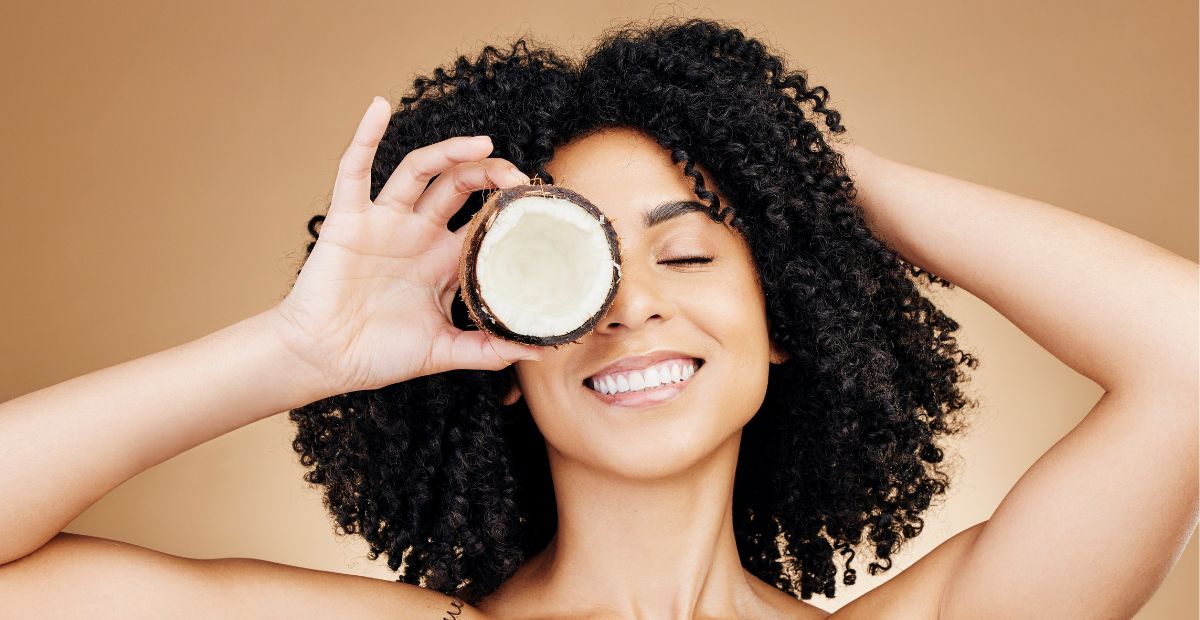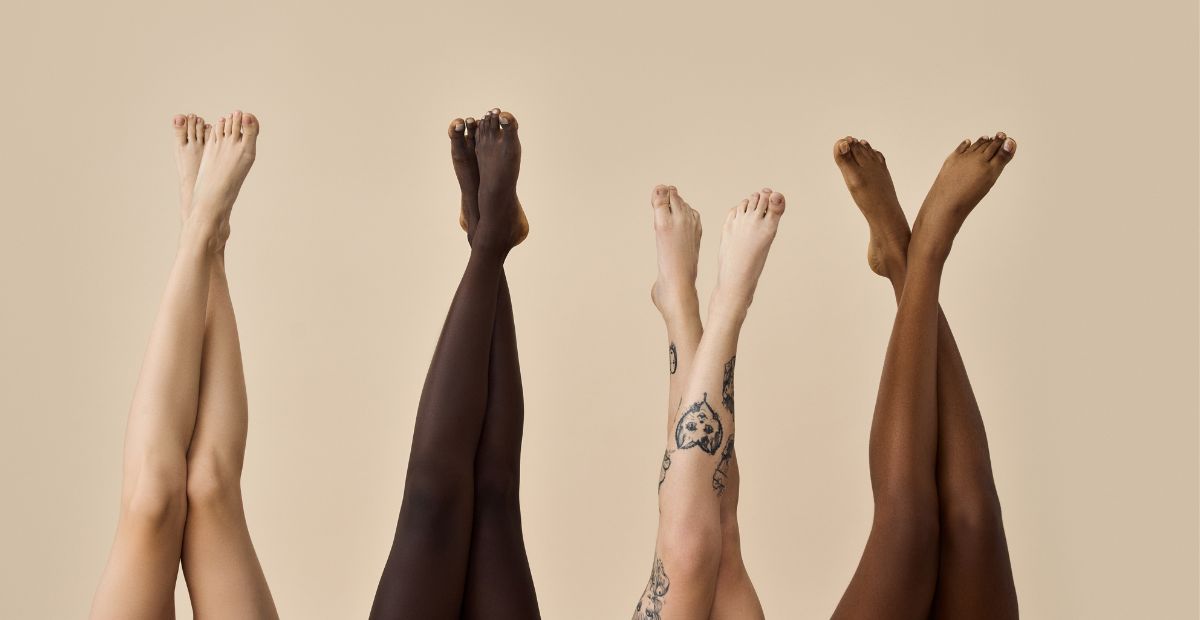Silicone in Hair Products: Yay or Nay?
Onskin Content Team
Your guides through the skincare chaos
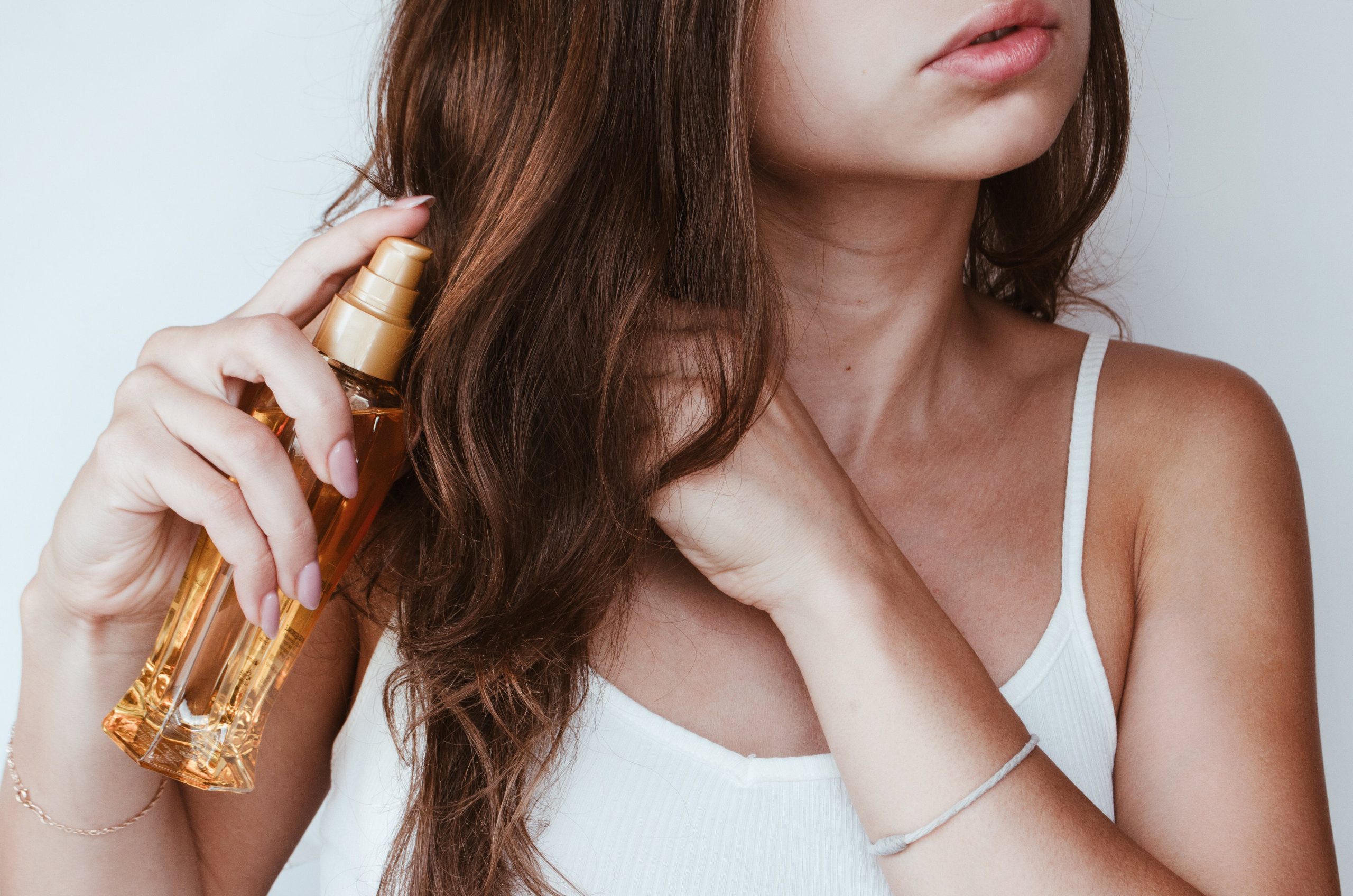
Silicones are the rock stars of the haircare universe. Reviews about them range from “They ruined my hair!” to “Superb for my locks” to “Help my ends look full!” Tons of shampoos and conditioners marketed as silicone-free might have led you to demonize and avoid them like the plague. Yet, almost every holy grail hair care product has them! So does silicone in hair products deserve its controversial rap?
First, let us be boring—it depends. Silicone can be your hair’s bbfs—you just have to figure out which type suits you (if any). Of course, that’s easier said than done! Here’s the essential info to know before you take your stance in the silicone debate.
What Are Silicones, and Why Are They Cooler than You Think?
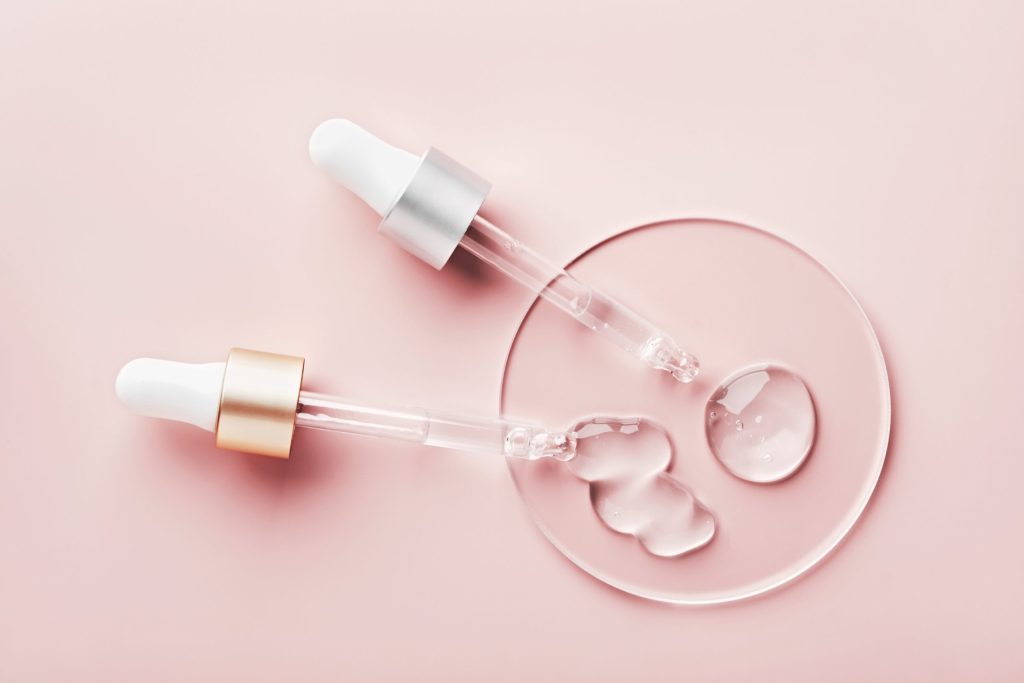
Silicones are synthetic, non-toxic components derived from silica, the main building material of sand and quartz. In a lab, you’d see it’s a transparent, gooey substance. On labels, you can recognize them by the –cone ending (but there are many that don’t have it). Coating your strands into something like plastic wiring, they lock in hydration and prevent it from evaporating. What’s in this “glazing” for your hair?
- Silicones instantly give your locks that red-carpet-ready (or at least going-out-ready) luxurious shine.
- They help seal split ends, wage war on frizz, and improve your tresses’ resistance to humidity (so you have fewer instances of styling your hair, only for it to turn into a fluffy cloud on your way to class).
- They make your hair easier to detangle and manage overall (they can even help you tame that unruly strand that keeps sticking out).
- Silicones prevent hair dye from washing out fast and protect your precious locks from UV rays and the heat from straighteners and curlers (super important if styling is your daily ritual).
- They’re also good rehab for damaged, bleached hair.
(Just a bonus silicone fact—that favorite long-lasting lipstick surviving your second mac and cheese round? You should probably thank silicones for that endurance.)
Now, if you’re impressed by silicones’ killer portfolio, we’re with you on that. But if you feel there should be a major plot twist and things are about to get hairy… you’re spot on!
Types of Silicones
“How can ingredients boasting so many benefits be so questionable?” Well, knowing their types will shed more light on this matter. Let’s welcome non-water soluble and water-soluble silicones into the room…
Non-water-soluble Silicone in Hair Products
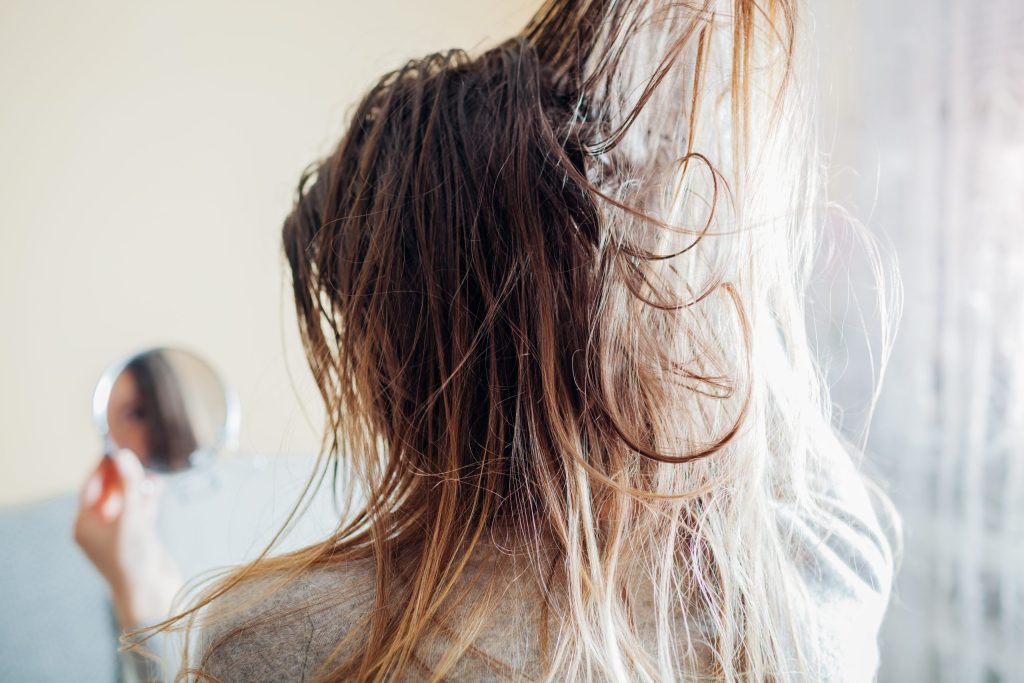
If these silicones had merch, they’d have “Live now, pay later!” on it—they are so sneaky they make you pay for the beauty of your hair… with the beauty of your hair.
Now let us explain.
Ever realized your hair is greasy and feels heavy, even though you washed it just a couple of hours ago? Hardly anything is more evil than that! And non-soluble silicones might be the masterminds behind this. Because the longer you use such silicones, the more they build up on your hair. This means they’ll block its shaft and not let so much-needed nutrients get in.
The catch is that this buildup is hard to rinse out with water; instead, you’ll need a clarifying shampoo. Such products are fantastic at removing product buildup—but in turn, they strip your tresses of natural oils, promoting dryness and flakiness. Plus, they may leave your scalp itchy and cause extra oiliness, brittleness, and even breakage (that’s what our hair probably sees in nightmares). And guess what can help with these issues? Right, silicones! Here we go again.
To avoid getting trapped in this vicious circle, watch out for these popular non-soluble silicones on the labels:
- Dimethicone
- Cetearyl methicone
- Cetyl dimethicone
- Stearyl dimethicone
- Dimethiconol
And if even the buildup can’t stop you from loving what silicones do to your hair, remember to use clarifying shampoos regularly and look for those with gentler surfactants (cleansing agents):
- Cocamidopropyl betaine
- Coco glucoside
- Sodium cocoyl isethionate
- Sodium lauryl glucose carboxylate
Water-soluble Silicone in Hair Products

Now, let’s meet the good guys. Water-soluble silicones are easily washed out from hair with gentle shampoos and won’t create buildup, all while offering all the benefits “regular” silicones have. A win-win! How do you spot them on the label? Look for PEGs, and the higher the number in the component, the more water-soluble the silicone is.
Examples of water-soluble silicones are
- Peg 7 amodimethicone
- Behenoxy PEG-10 dimethicone
- PEG-8 (or higher) dimethicone
- Bis-PEG-8 (or higher) dimethicone
- Bis-PEG-12 dimethicone beeswax
- Laurylmethicone copolyol
- Vinyl dimethicone
If you’re not a fan of squinting to decipher those tiny words on labels (after all, our eyes deserve princess treatment just like our hair), ingredient scanners can help you pinpoint the good or not-so-good ingredients. For instance, OnSkin indicates whether a hair product contains silicones and also determines their type—simply scan the product or type its name.
So What’s the Big Picture?
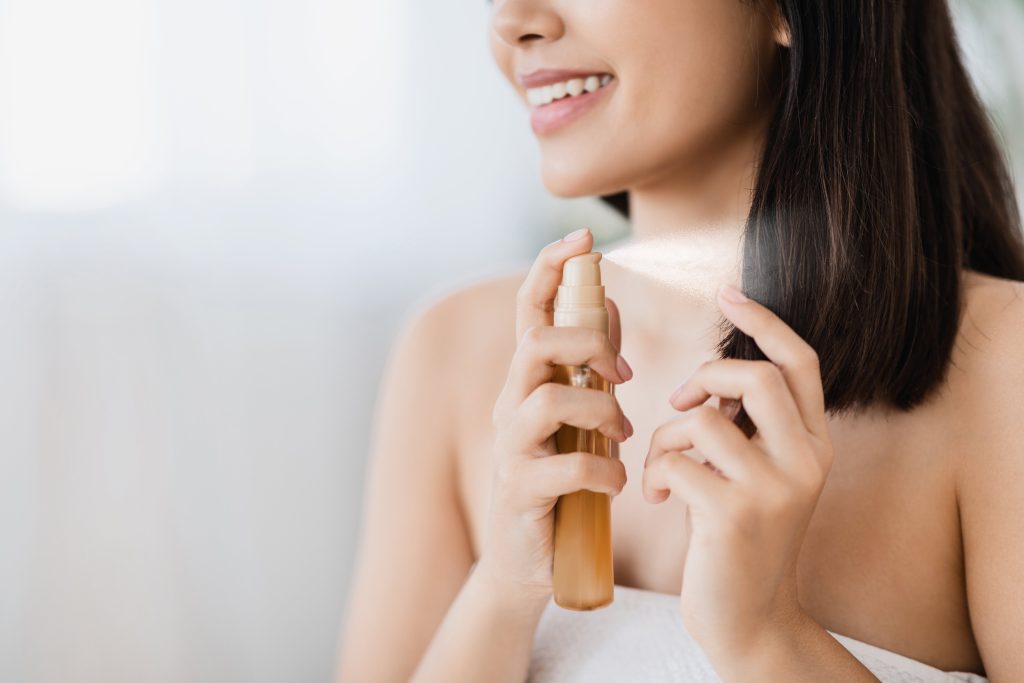
- As a rule, the healthier your hair is, the less chance it needs silicones. If your locks are damaged, frizzy, and porous, silicones could be the superhero they’ve been waiting for.
- Not a stickler for taking risks, especially with your hair? Trying silicones briefly won’t disrupt even the most meticulous hair routine. Test a silicone-based product (make soluble silicones a priority) and trust your hair instincts; you’ll know if silicones aren’t your vibe.
- (A moment of silence for all the shampoos and conditioners we started but eventually abandoned.)
- Have you been using products with non-water-soluble silicones forever (even without realizing it), and your hair is thriving? We’re not here to blow you off course. To ensure your hair doesn’t get “overfed” with silicones, use a clarifying shampoo when you notice your locks feel and look weighed down, which might be a sign of buildup.
- Your hair says meh or even yikes when introduced to silicones? Well, no matter how cool they are, there’s more fish in the sea—consider incorporating products with panthenol, niacinamide, or sodium hyaluronate into your haircare routine. These moisturizing ingredients won’t create product buildup.
- And finally—sorry for being boring again—moderation never hurts, be it with silicone-containing products, perfume, tacos, denim in your outfits… You get the idea.
P.S.
Whenever you feel like screaming, “Somebody please help me find what works for me!” while shopping for haircare, use ingredient scanners to save time and avoid guesswork. OnSkin also works with skincare, makeup, and many other types of products.
- Silicones used in permanent and semi-permanent hair dyes to reduce the fading and color change process of dyed hair occurred by wash-out or UV radiation. (2004). https://pubmed.ncbi.nlm.nih.gov/15645088/
FAQ
-
Where do I start with OnSkin?
Download the app and think of a product you’d like to know more about. Then, go to the main screen and choose how you’d like to get the info —by manually looking it up in the search bar, by scanning its barcode, or by simply taking a picture of the packaging. Once you’ve done any of these, you can see how safe the product is and if it suits your skin or hair (if this analysis is available).
-
What is Safety Rating, and how is it calculated?
In OnSkin, we base product rates on ingredients. Each is closely studied by our medical team and then evaluated. This way, each product gets a score from 0 to 100, with 100 as the safest level.
Safety Levels
- Excellent (76–100)
- Good (51–75)
- Not great (26–50)
- Bad (0–25)
These scores are backed by the latest scientific studies. You can find links to the resources we’ve used on each ingredient page. To assess the safety of product ingredients, we evaluate them according to the following parameters/criteria
- Endocrine disruption risk / Reproductive toxicity
Indicates the probability of mimicking, blocking, or interfering with the body hormones.
- Сarcinogenicity
Measures the potential risk of inducing cancer.
- Allergy risk
Estimates the probability of an allergic reaction.
- High concentration alert
Determines the risk of being unsafe in certain amounts.
-
What is Skin Match?
Based on the info you input about your skin type, age, skin care goal, and other “settings,” OnSkin checks how well a product is tailored to your unique skin needs — it’s basically like a dermatologist helping you find the right products, minus the fees and the long wait. The product you’re checking might be labeled as It’s a match!, Hit-or-miss, or Not a match for you. The app also detects ingredient groups such as Anti-acne, Anti-inflammatory, Moisturizes, May be drying, Comedogenic, and others — by tapping one, you see exactly what ingredients from this or that group are in the product.
-
I seem to have a problem with using the app. Who should I contact?
Please reach out to us at [email protected], and we’ll carefully look into your issue. Your ideas for improving the app are also very welcome!
-
Do you have an Android version?
Not yet! Hey Android users, we hear you, and we're thinking about making an Android version, but we haven't started the development yet.
Tracker Sent!
It’s on the way to your inbox.


